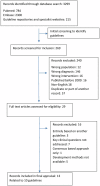Pharmacological guidelines for schizophrenia: a systematic review and comparison of recommendations for the first episode
- PMID: 28062471
- PMCID: PMC5223704
- DOI: 10.1136/bmjopen-2016-013881
Pharmacological guidelines for schizophrenia: a systematic review and comparison of recommendations for the first episode
Abstract
Objectives: Clinical practice guidelines (CPGs) support the translation of research evidence into clinical practice. Key health questions in CPGs ensure that recommendations will be applicable to the clinical context in which the guideline is used. The objectives of this study were to identify CPGs for the pharmacological treatment of first-episode schizophrenia; assess the quality of these guidelines using the Appraisal of Guidelines for Research and Evaluation II (AGREE II) instrument; and compare recommendations in relation to the key health questions that are relevant to the pharmacological treatment of first-episode schizophrenia.
Methods: A multidisciplinary group identified key health questions that are relevant to the pharmacological treatment of first-episode schizophrenia. The MEDLINE and EMBASE databases, websites of professional organisations and international guideline repositories, were searched for CPGs that met the inclusion criteria. The AGREE II instrument was applied by three raters and data were extracted from the guidelines in relation to the key health questions.
Results: In total, 3299 records were screened. 10 guidelines met the inclusion criteria. 3 guidelines scored well across all domains. Recommendations varied in specificity. Side effect concerns, rather than comparative efficacy benefits, were a key consideration in antipsychotic choice. Antipsychotic medication is recommended for maintenance of remission following a first episode of schizophrenia but there is a paucity of evidence to guide duration of treatment. Clozapine is universally regarded as the medication of choice for treatment resistance. There is less evidence to guide care for those who do not respond to clozapine.
Conclusions: An individual's experience of using antipsychotic medication for the initial treatment of first-episode schizophrenia may have implications for future engagement, adherence and outcome. While guidelines of good quality exist to assist in medicines optimisation, the evidence base required to answer key health questions relevant to the pharmacological treatment of first-episode schizophrenia is limited.
Keywords: antipsychotic; psychosis.
Published by the BMJ Publishing Group Limited. For permission to use (where not already granted under a licence) please go to http://www.bmj.com/company/products-services/rights-and-licensing/.
Conflict of interest statement
Conflicts of Interest: None declared.
Figures
References
-
- Cowen P, Harrison P, Burns T. Shorter Oxford textbook of psychiatry. Oxford University Press, 2012.
-
- Scottish Intercollegiate Guidelines Network. Management of Schizophrenia. SIGN 131, 2013.
-
- Schizophrenia Commission. The abandoned illness: a report from the Schizophrenia Commission. London: Rethink Mental Illness, 2012.
-
- McGorry P, Bates T, Birchwood M. Designing youth mental health services for the 21st century: examples from Australia, Ireland and the UK. Br J Psychiatry 2013;202(54):s30–5. - PubMed
Publication types
MeSH terms
Substances
LinkOut - more resources
Full Text Sources
Other Literature Sources
Medical
Miscellaneous

